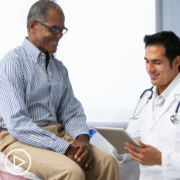What Questions Should Prostate Cancer Patients Ask About Testing and Test Results?
What Questions Should Prostate Cancer Patients Ask About Testing and Test Results? from Patient Empowerment Network on Vimeo.
What are key questions for prostate cancer patients to ask about testing and test results? Dr. David Wise explains the concept of shared decision-making and advice for taking to your doctor about test results to help access quality care.
Dr. David Wise is Director of Genitourinary Medical Oncology at the Laura and Isaac Perlmutter Cancer Center at NYU Langone Health. Learn more about Dr. Wise.
See More From INSIST! Prostate Cancer
Related Resources

|

Prostate Cancer Testing: What Tests Should You Advocate For? |

How Do Biomarker Test Results Impact a Prostate Cancer Patient’s Prognosis? |
Transcript:
Dr. David Wise:
It’s a good question. I think patients, first of all, should really understand that although the oncologist often has a lot of information and often a lot of experience, the patient is the one that really should have the power to make the decisions.
And the patient should often remind the oncologist of that, that shared decision-making is a crucial empowerment concept that patients need to understand.
Patients come into a treatment in an incredibly vulnerable position, and that’s for a few different factors. And I think that they need to understand that they need to express their preferences, and they need to actively take part in that decision. And I think expressing that is really important. I think oncologists should also help patients understand that, that they’re the ones in the driver’s seat, that they’re the ones that have the power to make the decision, and that the position should be arrived at in a shared decision framework.
In terms of questions patients should ask, patients should always ask about alternative. I think oftentimes, you hear maybe just treatment option that oncologist thinks might be the best, but I think it’s important to constantly say, “Well, what are the alternative here? Is there anything else that we could think about?” Perhaps that treatment that you’re suggesting sounds really exciting, but it really may not work for me for my particular context.
So, is there another option that the oncologist may not be thinking about because it wouldn’t be their usual recommendation. But maybe in my specific circumstance, there might be something that would work better for me. I think those are the kinds of questions, continuing to voice your preferences, what you want.
Finding the right treatment is so critical. And arriving at it from a shared decision-making, it just continues to build that relationship, and it makes for a much better dynamic over the course of that treatment and others.










